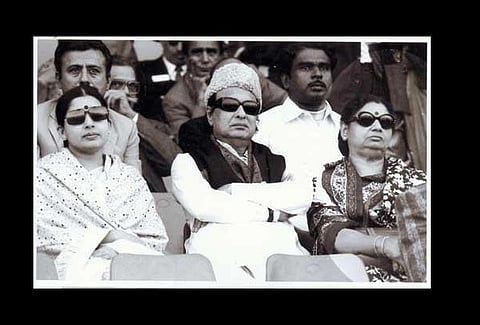

The News Minute brings you the Dravidian Chronicles, a collection of narratives on the margins of the 2016 election spotlight. Here we chronicle smaller, subtler shifts that catalyse and metamorphose the grand narratives of the electoral juggernaut.
“History will judge a man by his heirs,” goes a loosely-translated Thirukurral couplet. So too, Tamil Nadu Chief Minister MG Ramachandran will be remembered, not just for his list of achievements, but also for not anointing a political successor until his death.
The battle to take control over the AIADMK party commenced no sooner than December 24, 1987 – the day MGR died. The party was split into two factions – one set pledged loyalty to MGR’s legal wife, Janaki and the other to his leading lady in 28 films, Jayalalithaa.
For Janaki, who had given up acting after marriage, becoming her husband’s successor was more personal than political. “She had a score to settle with Jayalalithaa,” says TN Gopalan, a veteran journalist. She succumbed to the pressures of senior leaders like RM Veerappan, who wanted to keep Jaylalaithaa out at any cost. Many still vividly remember the image of Jayalalitha being pushed and abused by party leaders like KP Ramalingam from atop the gun carriage carrying MGR’s body during his funeral procession.

Jayalalithaa, on the other hand, who had been hand-picked by MGR and initiated into the party in 1982, had been waiting in the wings to take over the AIADMK. “One of the main reasons MGR brought Jayalalithaa into the party then, was because there had been no one else who was popular and could win voters over,” Gopalan points out. And while MGR had groomed Jayalalithaa, he stopped short of announcing her as his political heir. Gopalan cites a conversation he had with a source close to the AIADMK leader, who stated, “MGR did not want to name Jayalalithaa as his heir. He did not want the party to survive after him.”
Two weeks after her husband’s death, Janaki was sworn in as Tamil Nadu’s first woman Chief Minister, with her faction producing 97 MLAs out of AIADMK’s 132 before the Governor. In his book ‘Tales of Old and New Madras: The Dalliance of Miss Mansel and 37 other stories of 375 years’, historian S. Muthiah writes, “It was the first instance of wife succeeding husband to this office in India, but the Governor made the appointment conditional on her proving within 21 days her claim of ‘enjoying the support of the majority of members of the legislature. ‘”
But Janaki Ramachandran’s government was short-lived, lasting 22 days. On the day of the vote of confidence, pandemonium broke out at the state Assembly. Two days later, Prime Minister Rajiv Gandhi dismissed her government, invoking Article 356 of the Constitution. The state was under President’s Rule for over a year before elections were held in January 1989.
Although the DMK went onto sweep the polls, 1989 is still remembered for settling the succession battle of the AIADMK. With MGR’s heroines claiming their right to his legacy, the campaigning befitted the occasion. Old movie posters featuring the late matinee idol and a young Jayalalithaa were spruced up and pasted across towns. Although MGR’s fan clubs were torn over whom to support, Janaki managed to win the support of another leading man in the film industry – Sivaji Ganesan, who had exited the Congress to start his own party.
But more than sparring over which faction deserved the AIADMK’s two leaves symbol (which the Election Commission ended up freezing), it was the way they positioned themselves vis-a-vis DMK chief Karunanidhi that set them apart. “Jayalalithaa grasped early on that the gravity of Tamil Nadu politics is anti-Karunanidhi,” notes R. Mani, a senior journalist. He points out that what cost Janaki the election was not only her lack of aggression but her outright praise of MGR’s arch-rival, Karunanidhi – something an average AIADMK voter is unable to stomach. By marking Karunanidhi as her political adversary, Jayalalithaa ended up with 27 seats against Janaki’s 2.
Ten days after the elections, MGR’s wife announced that she had “decided to quit politics and not hinder anyone.” The AIADMK was Jayalalithaa’s to take.
Also read: